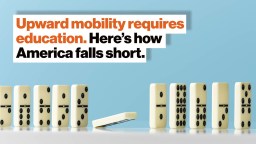ELIZABETH GARLOW: Being laser-focused on this goal of increasing education attainment here in the US has really opened us up at Lumina to unconventional partnerships and different types of collaborations. And we think that in particular, as a foundation, we need to rethink what it means to be innovative. And we'd like to partner with entrepreneurs to help us do that. So, often, the conventional sort of model around innovation is you might try a pilot, you might scale it to some sort of large demonstration, and then try to mainstream it. We actually think that innovation, particularly innovation in education, might have more to do with this type of rapid prototyping and iteration, and helping us make those sort of quick changes, create feedback loops, and learn quickly about how we can create an education system that's more equitable and that works for more people to get the outcomes that they need and want.
But it's important that this is not just innovation for innovation's sake. We need innovation to be scalable and timely. And so when it comes to our work with entrepreneurs, we're really looking at companies that might be developing an innovation that can take root in a system and scale and change it in fundamental ways. And that's important to do because the future is now. The future is here. And so in order to keep pace with the change that we're seeing in both our education and work systems, We need to partner with individuals who can help bring a solution to bear in a way that can scale pretty rapidly and help us effect the change that's needed in today's society. At Lumina Foundation, we partner with entrepreneurs through our Lumina Impact Ventures work. This means that we are investing in companies, particularly those companies that are earlier in their stages of development and are looking to bring on partners that can really help inform and shape their strategy. And these are entrepreneurs who are working with education institutions and other types of providers and who are education providers themselves that are really meeting students where they're at.
So as part of this work, through our impact investing strategy, we really want to be student-centered. We feel like there's a lot of work that's happened that's really institution-centric, and it's good and important work, but we want to start from the place of the student. What does the student really need? What do they really want? How do we meet them where they're at? And we think that entrepreneurs are especially well equipped to do that because they're building products and services that can really address key pain points for students and make their educational journey more successful. At Lumina Foundation, we're constantly on the lookout for innovators that can help us reach our strategic objectives. And that's why we partnered with Big Think because we want to source ideas from individuals out there all across the country who are thinking about the future of learning and work. So we welcomed those ideas. We made it a participatory process where we invited individuals to vote on those ideas that were particularly resonant for them. And then we worked with those winners to hone their ideas and really make strategic connections and help them get their innovations out there into the world. Because we're going to need a lot of new ideas to get to the future we want to see.





